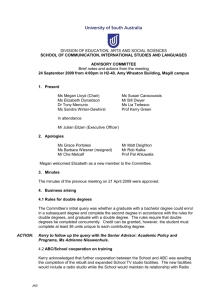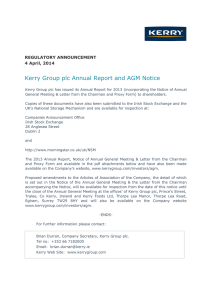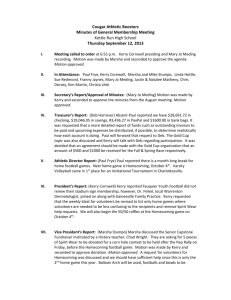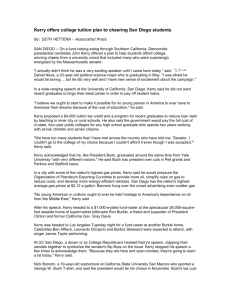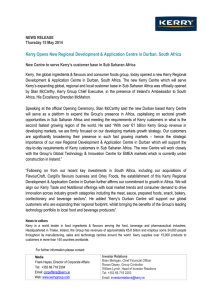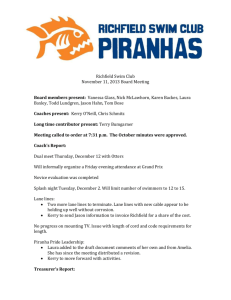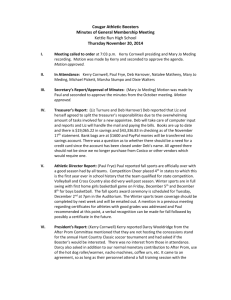2/07 - University of South Australia
advertisement
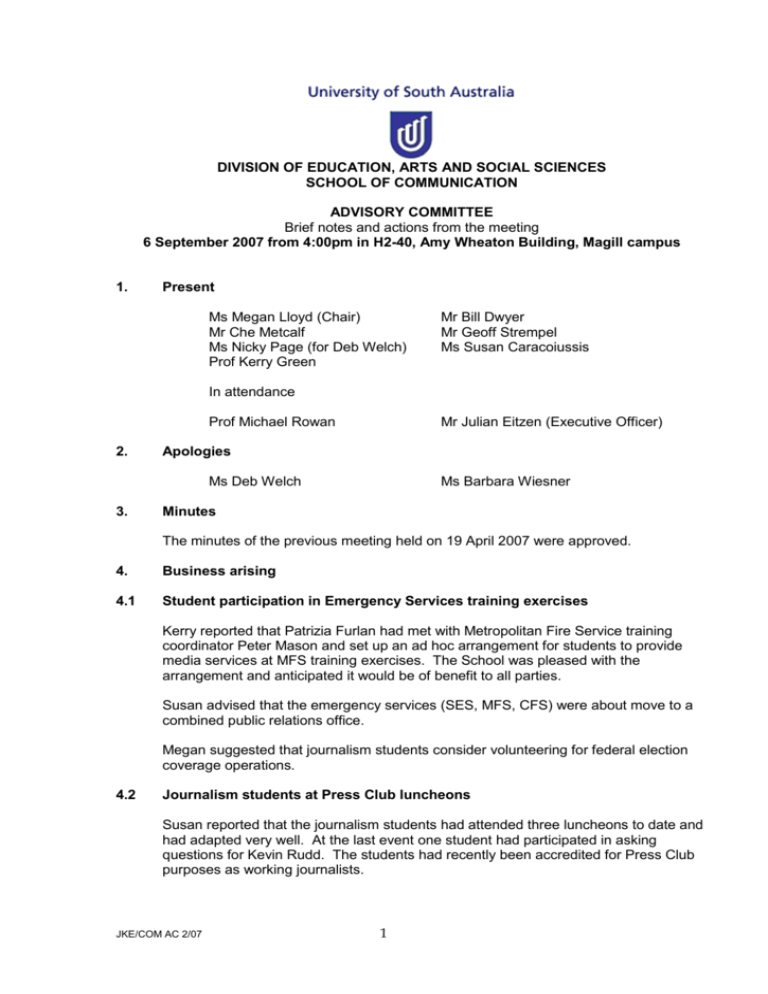
DIVISION OF EDUCATION, ARTS AND SOCIAL SCIENCES SCHOOL OF COMMUNICATION ADVISORY COMMITTEE Brief notes and actions from the meeting 6 September 2007 from 4:00pm in H2-40, Amy Wheaton Building, Magill campus 1. Present Ms Megan Lloyd (Chair) Mr Che Metcalf Ms Nicky Page (for Deb Welch) Prof Kerry Green Mr Bill Dwyer Mr Geoff Strempel Ms Susan Caracoiussis In attendance Prof Michael Rowan 2. Mr Julian Eitzen (Executive Officer) Apologies Ms Deb Welch 3. Ms Barbara Wiesner Minutes The minutes of the previous meeting held on 19 April 2007 were approved. 4. Business arising 4.1 Student participation in Emergency Services training exercises Kerry reported that Patrizia Furlan had met with Metropolitan Fire Service training coordinator Peter Mason and set up an ad hoc arrangement for students to provide media services at MFS training exercises. The School was pleased with the arrangement and anticipated it would be of benefit to all parties. Susan advised that the emergency services (SES, MFS, CFS) were about move to a combined public relations office. Megan suggested that journalism students consider volunteering for federal election coverage operations. 4.2 Journalism students at Press Club luncheons Susan reported that the journalism students had attended three luncheons to date and had adapted very well. At the last event one student had participated in asking questions for Kevin Rudd. The students had recently been accredited for Press Club purposes as working journalists. JKE/COM AC 2/07 1 ACTION: Kerry to place a story in the Uni News about the student engaging Kevin Rudd in questions at the Press Club luncheon. 4.3 Additional marketing opportunities Susan indicated that the opportunities she originally had in mind had not eventuated. Nicky suggested that Radio Adelaide would be willing to link their training web site to relevant School sites. Kerry welcomed the suggestion and indicated that it would most likely fit the Media Arts portal and “The Warbler”, the Schools online newspaper. 5. Members’ items Megan indicated willingness to develop the relationship between the Journalism program and the Messenger Press. Kerry suggested developing along the line of opportunities for interns in week long blocks. Megan announced that Messenger would move to an online editing system shortly and anticipated that would precipitate somewhat of a culture change. She noted that in the UK “Drudge” had become the journalism ‘maker’. ACTION: Kerry and Megan to liaise regarding intern arrangements and the online editor. ACTION: Kerry to discuss online journalism training with Susan Hill. Geoff reported that much effort had been going in to workforce planning for South Australian libraries. The central emphasis had been on developing “organic learning opportunities” for librarians to update to new technologies. He noted that at a recent SA Young Librarians conference that graduates were indicating that the skills they had been taught did not fit very well with the current library environment. ACTION: Library Studies group to organise a meeting with Geoff concerning librarian training. Susan alerted the Committee to the Press Club Scholarship which includes a return to study arrangement. Nicky noted that Radio Adelaide had transferred to digital broadcasting technology and would commence digital broadcasting from 1 January 2009. She noted that the station was looking in to arrangements with community radio and suggested that it might provide the School with opportunity to access new capacity. Kerry welcomed the suggestion and indicated that the School was developing shell courses to facilitate students taking up project work at short notice. 6. New business 6.1 Head of School report Kerry tabled the Head of School report (attached). He noted that the new and reorganised programs had been well received and were in strong demand. Only Bachelor of Arts (Communication and Culture) has not attracted as much interest, which would be investigated to determine whether that was an anomaly or a trend away from the program. Overall, the School would need to carefully manage demand for its undergraduate programs. Kerry outlined the growing economic importance of the creative industries and some possibilities for the School to participate in and lead its expansion in the state. JKE/COM AC 2/07 2 ACTION: Members’ advice sought on the Creative Industries options (refer appendix). Kerry advised the Committee that the School had been invited to Liverpool to lead the Games TV for the World Police and Fire Games 2008. The media role would be in conjunction with John Moores University Liverpool and would include a student team and up to six academics, several of which would also work on other projects while in the UK. Michael recommended Kerry contact Chris Hass to discuss funding options. Kerry informed members that the School would celebrate the thirtieth anniversary of the introduction of Communication degrees in the first week of December 2007. He sought nominations from members of potential invitees and advised that invitations would be distributed shortly. 6.2 Strategic planning Kerry tabled the strategic planning document. In particular, he noted that the School intended to build its capacity to offer all students the ability to publish their work in public forums. The emphasis in development would be in multimedia publishing but the School would be mindful not to extend its publishing enterprise as competition for the mainstream. It was considered expensive but necessary to make investments in capacity building for the School to remain useful and relevant to its stakeholders. Megan recommended Kerry contact Rod Savage for TV studio consultancy. 6.3 Arts degree renaissance Kerry tabled a cutting from “The Australian Higher Education” (O’Keefe, 5/9/2007) titled “Changing environment spells a possible renaissance for the arts degree”. He indicated that the School was well placed to catch the renewed interest in the BA. 7. Any other business Che advised that MegaSA was about to go national and that it had won $1 million in funding in support of its expansion. He noted that the industry viewed UniSA as progressive, particularly in the mobile space. Kerry indicated that the School intended to support MegaSA. ACTION: Kerry to discuss funding opportunities for MegaSA with Michael. The meeting closed at 5:15pm. 8. Next meeting The next meeting is to be confirmed for 2008. JKE/COM AC 2/07 3 School of Communication, Information & New Media Educating Professionals • Creating and Applying Knowledge • Serving the Community Memorandum To: Ms Megan Lloyd, Chair, School Advisory Committee From: Professor Kerry Green, HOS Copy: Date: 6 September 2007 Subject: Head of School’s report: CONFIDENTIAL The school finds itself at a crossroads as it approaches its 30th anniversary. Student demand for a number of the school’s degrees is strong, indicating students and the community continue to see those programs as relevant and useful, both in students’ quest for jobs and in terms of social utility. In particular, the journalism degree, updated and renamed the Bachelor of Journalism, and the new Bachelor of Media Arts, which grew out of the old Bachelor of Arts (Communication & Multimedia Studies) have attracted strong enrolments this year and were overwhelming favourites with potential students at the recent University Open Day. The school also has introduced a Bachelor of Public Relations degree, a Bachelor of Marketing and Communication degree, and has reorganised and refreshed the remaining programs into degrees that are strongly industry-focussed. The school is, therefore, in a good position to service the needs and requirements of South Australia’s students and communication industries. An article in yesterday’s Higher Education Supplement of The Australian (supplied) comments on the resurgence of the Arts degree, with employers seeking graduates with strong problem-solving and communication skills. If the article’s predictions are correct, the school is perfectly positioned to supply those needs. However, while the school has introduced new technology and associated new practices into its curricula, it has not concentrated the undeniable skills of individual academics into a single major or program to take advantage of their combined expertise and to encourage further convergence. At the same time, the economic impact of the so-called Creative Industries is becoming more readily apparent. China, in particular, has recognised the economic benefit to be derived from the Creative Industries and has begun to invest in them seriously, including investment in university programs. It is time, therefore, for the school to consider how it might both participate in and lead the expansion of the Creative Industries in South Australia. JKE/COM AC 2/07 4 To that end, the school would appreciate the advice of the School Advisory Committee members on how best to proceed. Some options are: 1. Introduce a Creative Industries Masters coursework degree 2. Introduce the above degree in conjunction with the South Australian School of Art and the Louis Laybourne School of Architecture and Design 3. Replace an existing undergraduate degree with a Bachelor of Creative Industries, either from within the school alone or across the schools listed above 4. Introduce a Bachelor of Creative Industries degree as above without replacing any existing degree 5. Introduce a research Centre for Creative Futures to show how and where the Creative Industries can benefit South Australia, with students from measures 1 to 4 above integrated into its research Each of the options would be expensive to introduce, so the committee’s advice would be welcome. In other areas: 1. Demand for the school’s programs was strong at the University Open Day two weekends ago, although there was some weakening in interest in the Bachelor of Arts (Communication and Culture). This may have been due to the scheduling of the various talkfests. 2. The school will apply for additional staff in a variety of programs for next year, but in particular for Journalism, Public Relations and Media Arts. 3. The school signed a Memorandum of Understanding (MOU) with the Shanghai Theatre Academy, the foremost performing arts academy in Shanghai, and is in the process of signing an MOU with the top-level Chinese University of Communication. 4. Chester University also may sign up with us. 5. We will lead the Games TV service at the World Firefighter Games (WFG08) in August in Liverpool next year, providing administration and some student support. 6. We expect staff visits from John Moores University Liverpool and the University of Chester over the next six months. The Liverpool staff will visit to familiarise themselves with the procedures required for the WFG08, while Chester University and UniSA will exchange staff during their respective cultural festivals in February and March. It is planned to make this a permanent arrangement with staff from each university teaching in each other’s programs. 7. The school has applied for funding of $500,000 to refurbish and update its Magill TV studio. This funding is unlikely to be approved in the next 12 months, but this places it firmly on the university’s development agenda. Regards Kerry JKE/COM AC 2/07 5
